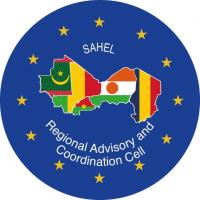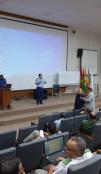A common border security in the Sahel matters for Europe

Terrorist organisations and transnational organised groups exploit the void left by state authorities by engaging in illicit activities, such as human trafficking.
The EU Regional Advisory and Coordination Cell (RACC), within its regional mandate on security and defence, supports the cooperation on borders security in the five countries of the G5 Sahel: Burkina Faso, Chad, Mali, Mauritania and Niger on security and defence to defeat the security threats of the region.
At regional level, in conjunction with the experts in the EU Delegation of the five countries in the Sahelian region, the RACC supports the work of the Department for Defense and Security of the Executive Secretary of the G5 Sahel on the identification of quick impact measures, including on border security. The RACC support to the Security Cooperation Platforms (PCMS) is part of this effort.
The RACC’s regional mandate and ability to “act nationally and think regionally” contributes to a wider vision of the challenges affecting the G5 Sahel countries, and the need a common policy on border security in favor of the economic and social development in the region.
The RACC’s Internal Security and Defence Experts (ISDEs), deployed as advisors within the EU Delegations of the above-mentioned countries, closely monitor the security situation on the ground. For example, the RACC’s advisors deployed within the EU Delegation to Mauritania in the capital Nouakchott, have the task of facilitating the implementation and coordination of the various European projects, aiming at enhancing border security’s cooperation.
In the field of defence, the G5 Sahel has a Joint Force. Mauritania's Joint Force battalion is on the front line to protect its southeastern border with Mali and fight transnational crime. The RACC’s defense expert in Nouakchott facilitates the implementation of the G5S Joint Force’s project, due to his privileged contacts with the Mauritanian authorities.
The RACC internal security expert supports the police component of the Joint Force’s project, whether it is the provosts or the specialised police investigation unit. These two units make it possible to judicialise the action of the military engaged on the border crossing areas.
In parallel, the RACC's internal security expert is involved in the development of GAR-SI - surveillance and intervention rapid action groups - which benefit from EU funding. The GAR-SI are gendarmerie units deployed in border areas, fighting against illegal trafficking and irregular migration. The support of the EU to the meharist (camel-mounted) unit of the national guard has meanwhile made it possible to ensure the presence of the State in the desertic east of the country, and to strengthen the border with Mali.
In its advisory role, the RACC facilitates the coordination between defense and security forces on border security in cooperation with international partners, such as IOM (International Organization for Migration), Interpol and UNODC (United Nations Office on Drugs and Crime).
Currently, efforts are underway to operationalise the CCPDG (Cooperation Center between Police, Customs and Gendarmerie) with IOM in the Sélibaby area, located on the borders of Mauritania, Mali and Senegal.
The Sahel continues to be considered part of the EU’s extended neighborhood.
Because crisis are interconnected, security issues affecting the Sahel inevitably have effects in Europe.
Working together for the security and the overall wellbeing of Sahelian and European citizens remains a common interest.





